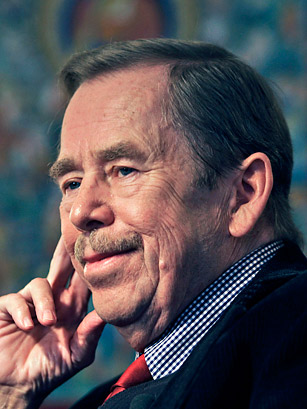
In the euphoric days after Vaclav Havel went from ex-prisoner to Czechoslovak president, he told friends, "I feel like an impostor." He kept dreaming that the old secret police showed up, stripped him of power, and threw him back in jail.
It did seem unreal. Havel, this short absurdist playwright, had led the bloodless 1989 Velvet Revolution that toppled one of Eastern Europe's coldest cold war regimes. Now he was president of ademocratic country, dining at the White House, welcoming the Rolling Stones, the Dalai lama and Prince Charles to Prague, the Czech capital city that had become the spiritual center of a new Eastern Europe.
Havel's death at the age of 75 was announced on Sunday, Dec. 18. The man who wrote absurdist dramas that ridiculed the brutal Communist flunkeys who ruled of his country — indeed of the Soviet bloc — had had severe health problems for years. But he managed to hang on long enough to see the Prague Spring and his work as a dissident inspire Chinese activists like Liu Xiaobo; long enough to see his experiences reincarnate in the Arab Spring, where beaten-down populations rose up against regimes almost as totalitarian and thuggishly imbecilic as the one he helped to overthrow. Havel was no longer president after the end of his term in 2003. But he remained iconic and relevant, even after reformers and other dissidents, such as Mikhail Gorbachev in Russia and Lech Walesa in Poland, lost their luster. The Czechs have lost an irreplaceable moral leader. He led them out of totalitarianism and into democracy. He made the world care about their country, and became the conscience of a confused region searching for a post-communist order.